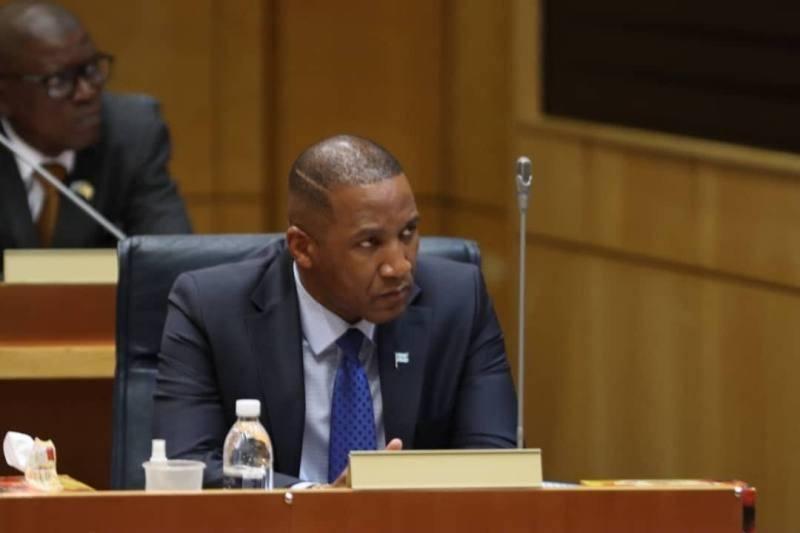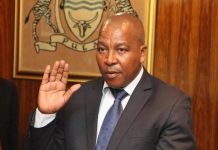Africa-Press – Botswana. Deep in the barren soils of Central Kgalagadi Game Reserve (CKGR), where landscape stretches brown and dusty in every direction, a light utility Botswana Defence Force (BDF) AS 350 helicopter made a historic landing.
Pallbearers in the form of Cabinet ministers dismounted a royal white coffin from the aircraft. It was indeed a moment to behold as finally the son of the soil Mr Pitseng Gaoberekwe had taken the country road home, where he will rest among his ancestors.
In the presence of President Advocate Duma Boko, Vice President Ndaba Gaolathe and several cabinet ministers as well as residents of Molapo, Mothomelo, Xade and Gope braved the unforgiving terrain and united in paying tribute to their symbol of resilience.
To those who became accustomed to his journey in life until death, Mr Gaoberekwe had traversed an unpredictable journey, but his is a powerful story of resilience that even in death victory became imminent. Like a decorated army general, the deceased had faced many battles in the arc of his life.
As if that was not enough, the past administration would not allow his family to bury him inside CKGR.
Mr Gaoberekwe had lived all his life in the reserve and moved out in 2014 to be near his children toward the end of his life. He was determined to live all his life at Metsiamanong, it was always his indigenous right to do so.
In his deepest of souls, he knew he had all the rights to live and die in his ancestral land and no else could take such away from him.
When he took his last breath in 2021, his family was steadfast in honouring his death wish, to bury him inside the CKGR.
The family’s resilience over the past three years had been a blistering testimony of honouring his death wish.
The refusal by a court judge to have Mr Gaoberekwe buried on his ancestral land nearly ignited the bitter wounds of a long standing scuffle between the Basarwa community and the government.
Weeks earlier President Boko had brought hope to the Basarwa community and the Gaoberekwe family when he announced that government would honour his death wish and bury him in Metsiamanong.
“One of our own is unable to rest far from his home, country road please take him home to where he belongs. These words hit my soul like bolts of lightning and now they leave my lips and they will carry the soul of a son of the soil home to CKGR where he can finally be at peace,” said Adv. Boko when making an announcement that Pitseng would finally be buried in Metsiamanong.
President Boko said he felt that government under the cover of a court judgment denied Mr Gaoberekwe the dignity of a proper burial in his ancestral land. As such he took the bold step of abandoning all the judgements and sending him off in a dignified manner at a place he belonged.
The CKGR was established by the colonial government on February 24, 1961 to protect wildlife resources and reserve sufficient land for traditional use by hunter gatherer communities of the central Kgalagadi.
According to Botswana government report of the CKGR fact finding mission of 1985, resident population of the CKGR was about 3 000 people when it was gazetted in 1961.
Numbers declined due to serious droughts and there was overall outmigration from the CKGR to Ghanzi farms or to boreholes in central and Kweneng districts as water was becoming increasingly scarce. In this inhospitable territory lived the Basarwa clan, whose society had been shaped by this rugged natural environment.
In 1997 over 1 700 Basarwa were relocated from the CKGR by government as part of the largest resettlement programmes ever undertaken in Botswana.
A majority relocated to New Xade while some went to Kaudwane and Xere outside the southern and northern borders of the reserve respectively.
A further resettlement followed in 2002 when residents of settlements such as Molapo and other were relocated. The relocation was done in order to conserve natural resources and promote community development, among the Basarwa communities.
The relocations sparked international controversy, fuelled by a London-based NGO Survival International, whose claim to protest was that indigenous people globally had a right to their ancestral land.
The Basarwa, including Mr Gaoberekwe, led by the elderly tribesman, Roy Sesana began their hunt for justice, which case provoked worldwide concern and hogged international news headlines. In 2006 the court ruled that the evictions had been unlawful and unconstitutional, which verdict was sweet victory for the Basarwa community.
According to analyst, Mr Kabo Garechaba, the decision by Adv. Boko and his government to allow Gaoberekwe family to bury their son represents a major paradigm shift on Botswana’s human rights record.
“Basarwa who had been feeling marginalised and at the mercy of government and the judiciary will feel a sense of rejuvenation that someone at the level of a head of state finally understood their plight. It is even more symbolic that the burial coincides with International Human Rights Day – President Boko lifted the PI status of Steven Corey, head of Survival International, a non-state actor that stood for Basarwa against government,” said Mr Garechaba.
Gaoberekwe died on December 21, 2021 after being transported to New Xade for medical assistance following a critical illness.
According to his son, Mr Keitatotse Pitseng, following his demise, government argued that his relocation to New Xade made it an appropriate burial site, but the family insisted on honouring their father’s death wish to be buried in CKGR.
This disagreement complicated burial arrangements for over three years. Mr Gaoberekwe said they had lost two of Pitseng’s siblings who died due to stress-related complications as their brother had been lying in the mortuary too long.
The Court of Appeal at some point had given the family seven days to bury the deceased in any place of their choice apart from the CKGR, but it was never to happen as the family was adamant on honouring the dearly departed’s wish and as fate had it, Mr Gaoberekwe was finally laid to rest yesterday, the day the global community commemorated International Human Rights Day.
For More News And Analysis About Botswana Follow Africa-Press






